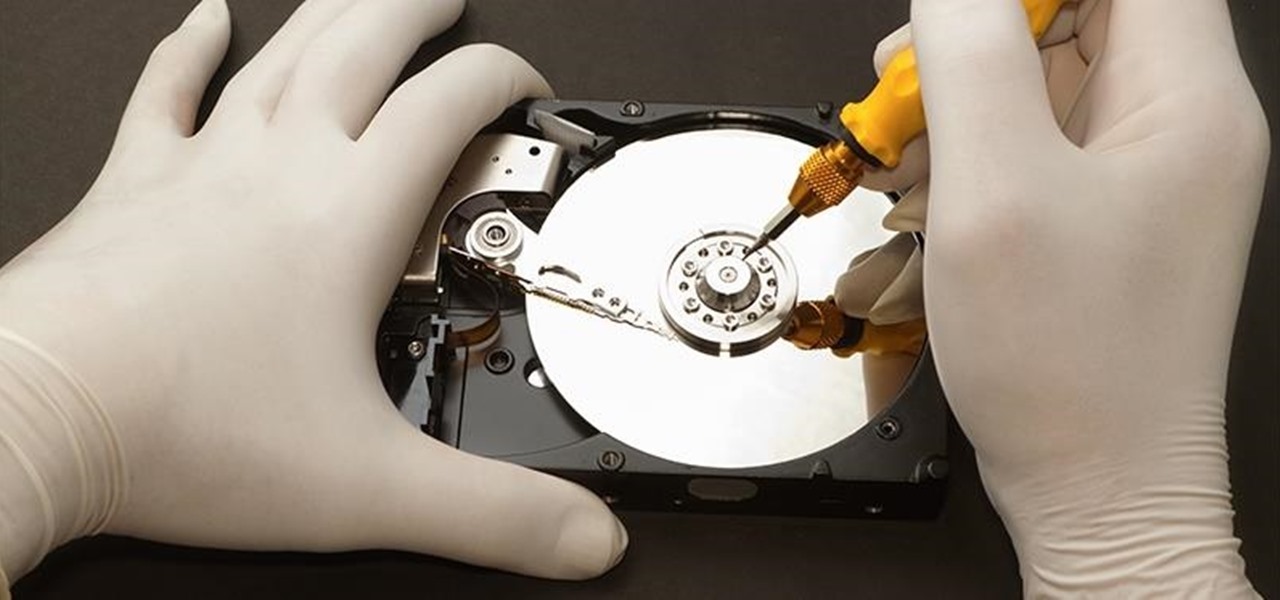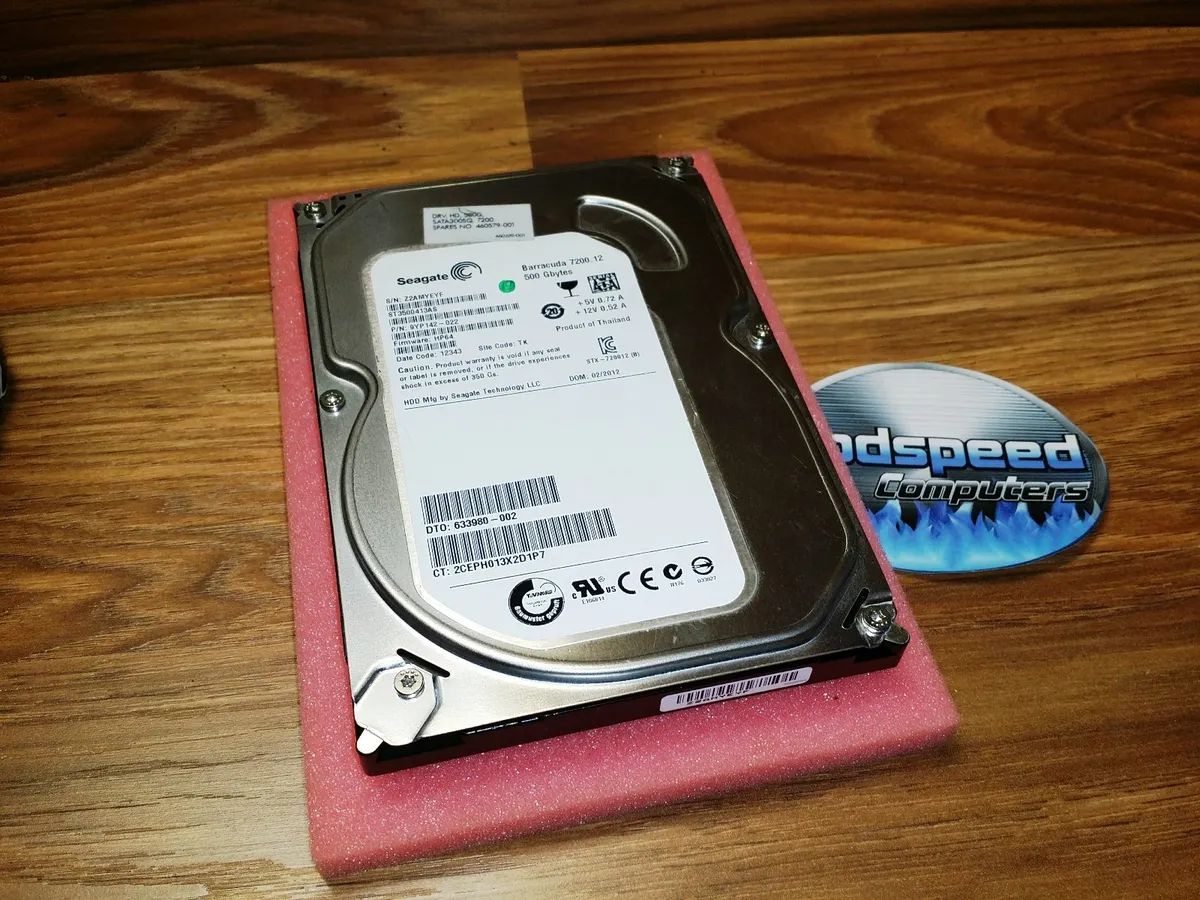Introduction
Welcome to the world of hard disk drive forensics, where data investigation meets cutting-edge technology. In today’s digital age, where information plays a pivotal role in various aspects of our lives, the need to navigate and analyze data stored on hard disk drives has become increasingly important. From criminal investigations to corporate misconduct, hard disk drive forensics plays a crucial role in uncovering valuable evidence and solving intricate puzzles.
Hard disk drive forensics involves the systematic recovery, analysis, and preservation of electronic data stored on hard drives. It is a specialized branch of forensic science that utilizes advanced techniques and tools to extract vital information from digital storage devices, such as computers, laptops, or external drives. By carefully examining the data remnants left behind, forensic experts can reconstruct events, trace user activities, and recover deleted files, shedding light on crucial details that can prove instrumental in a wide range of investigations.
The field of hard disk drive forensics has witnessed remarkable advancements in recent years. As technology continues to evolve, so do the techniques and methodologies used in this discipline. Today, forensics experts have access to a multitude of sophisticated software and hardware tools that enable them to dissect digital artifacts and unearth hidden evidence with greater efficiency and accuracy.
In this article, we will delve into the world of hard disk drive forensics, exploring the intricacies of how it works, the importance it holds in various domains, its applications, as well as the challenges and limitations that come with it. Whether you are a curious reader seeking to understand the fascinating realm of digital investigations or a professional looking to deepen your knowledge in this field, join us on this journey as we uncover the secrets hidden within hard disk drives.
Definition of Hard Disk Drive Forensics
Hard disk drive forensics, also known as computer forensics or digital forensics, is a branch of forensic science that focuses on the investigation and analysis of electronic data stored on hard disk drives. It involves the collection, preservation, and examination of digital evidence to uncover relevant information for legal or investigative purposes.
In simpler terms, hard disk drive forensics is the process of gathering and analyzing data found on computer hard drives to determine how information was accessed, modified, or deleted. This field combines elements of computer science, law enforcement, and investigative techniques to piece together a digital story and reconstruct events related to a specific case or incident.
The fundamental goal of hard disk drive forensics is to maintain the integrity of the digital evidence and ensure that it is admissible in a court of law. Forensics experts follow a strict chain of custody and employ specialized tools and techniques to extract data without altering or tampering with the original contents of the hard drive. They use scientific methods to recover deleted files, examine system logs, analyze software artifacts, and identify traces of user activity that may be crucial to a case.
Hard disk drive forensics encompasses a wide range of investigative tasks, including data acquisition, data analysis, data recovery, and reporting. It involves working with various file systems, such as NTFS, FAT, or HFS, to explore hidden and deleted data, identify timestamps, and reconstruct file allocation information. Forensic examiners often rely on advanced software applications that facilitate the examination of digital artifacts and provide in-depth analysis of the data.
Overall, hard disk drive forensics is an essential tool in modern-day investigations, allowing law enforcement agencies, private investigators, and cybersecurity experts to uncover critical evidence, solve complex cases, and establish the truth. It bridges the gap between technology and law, ensuring that digital evidence is both legally admissible and scientifically sound.
How Hard Disk Drive Forensics Works
Hard disk drive forensics involves a systematic and meticulous process to extract, analyze, and interpret data stored on a hard drive. While the exact methodology may vary depending on the specific case and tools used, the following steps provide a general overview of how hard disk drive forensics works:
- Data Acquisition: The first step in the forensic process is acquiring a forensic image of the hard drive. This involves creating a bit-by-bit copy of the entire hard drive or specific partitions. The forensic examiner uses specialized software or hardware write blockers to ensure that the original evidence is not modified during the acquisition process.
- Data Preservation: Once the forensic image is created, the examiner preserves the integrity of the evidence by ensuring that the forensic copy is securely stored and protected from any alterations. This includes utilizing digital hash algorithms to create a unique identifier for the forensic image, ensuring its authenticity and integrity throughout the investigation.
- Data Analysis: With the forensic image in hand, the examiner begins analyzing the data stored on the hard drive. This involves examining the file system, metadata, and directory structures to identify and extract relevant files and directories. Advanced forensic tools are utilized to search for specific keywords, file types, or patterns that may be relevant to the investigation.
- Data Recovery: In some cases, deleted or hidden data may hold crucial evidence. Forensic experts employ specialized techniques and software to recover deleted files or fragments of files that may still exist on the hard drive. This can include examining file slack space, unallocated clusters, or performing data carving to reconstruct deleted files.
- Data Interpretation: Once the data has been extracted and recovered, the forensic examiner interprets and analyzes the information in the context of the investigation. This includes correlating timestamps, examining system logs, and identifying user activities to reconstruct the sequence of events. The examiner also looks for any signs of tampering, encryption, or attempts to conceal data.
Throughout the entire process, forensic experts adhere to a strict chain of custody to ensure the admissibility and integrity of the evidence in court. Documentation and detailed reporting are vital to clearly present the findings and analysis in a concise and understandable manner. The result is a comprehensive analysis of the hard drive’s contents, providing valuable insights into the digital activities and potential evidence that may aid in solving the case.
Importance of Hard Disk Drive Forensics
Hard disk drive forensics plays a critical role in various domains, from criminal investigations to corporate misconduct cases. Its importance lies in its ability to extract crucial evidence from digital storage devices, providing invaluable insights into user activities, data tampering, and information retrieval. The following are key reasons why hard disk drive forensics is of utmost importance:
1. Solving Criminal Cases: In criminal investigations, hard disk drive forensics can uncover vital evidence that can link suspects to criminal activities, establish timelines of events, and provide irrefutable proof in court. By examining digital artifacts, such as emails, chat logs, or internet browsing history, forensic experts can reconstruct digital footprints and uncover hidden connections, leading to the identification and prosecution of criminals.
2. Investigating Digital Crimes: With the rise of cybercrime, hard disk drive forensics has become essential in investigating digital offenses, such as hacking, fraud, or identity theft. Forensic experts can analyze system logs, network traffic, and malware to trace the origin of attacks, identify the tactics used, and gather evidence against perpetrators. This assists in holding cybercriminals accountable and safeguarding digital infrastructures.
3. Proving or Disproving Employee Misconduct: In cases involving employee misconduct or violations of company policies, hard disk drive forensics can provide a clear picture of an employee’s digital activities. By analyzing emails, documents, or files accessed on company computers, forensic experts can determine whether an employee has committed any misconduct, such as leaking sensitive information, intellectual property theft, or engaging in unauthorized activities.
4. Protecting Sensitive Information: Hard disk drive forensics plays a crucial role in data breach investigations. By analyzing compromised systems, forensic experts can determine the extent of the breach, the techniques used by attackers, and the data that may have been accessed or stolen. This helps organizations identify vulnerabilities, enhance security measures, and prevent future breaches.
5. Ensuring Judicial Integrity: Hard disk drive forensics is crucial in maintaining the integrity of digital evidence in legal proceedings. By following strict protocols and utilizing robust forensic tools, forensic experts ensure that the evidence extracted from hard drives is admissible in court. This ensures a fair trial, protects the rights of the accused, and strengthens the judicial process.
In summary, hard disk drive forensics serves as a powerful tool in investigations, providing vital evidence, uncovering digital footprints, and helping solve complex cases. Its importance extends to various domains, from law enforcement and cybersecurity to corporate governance and data protection. By leveraging the expertise and techniques of hard disk drive forensics, investigators can unravel the truth and ensure justice prevails.
Applications of Hard Disk Drive Forensics
Hard disk drive forensics finds application in a wide range of scenarios where digital evidence is crucial for investigations or legal proceedings. From solving criminal cases to conducting internal corporate investigations, the following are key applications of hard disk drive forensics:
1. Recovering Deleted Data: One of the primary applications of hard disk drive forensics is the recovery of deleted or hidden data. Forensic experts can use specialized tools and techniques to retrieve files that have been intentionally deleted, lost due to system errors, or hidden from view. This can be invaluable in criminal investigations, corporate litigation, or any scenario where accessing deleted data may provide key insights or evidence.
2. Investigation of Digital Crimes: Hard disk drive forensics plays a vital role in investigating digital crimes, such as hacking, cyber fraud, or online harassment. By analyzing digital artifacts, network logs, and system activity, forensic experts can trace the origin of malicious activities, identify the methods used by perpetrators, and gather evidence for legal proceedings. This helps in holding cybercriminals accountable and protecting individuals and organizations from digital threats.
3. Proving or Disproving Employee Misconduct: When allegations of employee misconduct or violations of company policies arise, hard disk drive forensics can provide valuable insights into an employee’s digital activities. By analyzing their computer usage, access logs, communication records, and document history, forensic experts can uncover evidence of unauthorized actions, intellectual property theft, or data breaches. This assists employers in taking appropriate action and ensuring a fair and thorough investigation.
4. Protecting Sensitive Information: Hard disk drive forensics is essential in investigating data breaches and ensuring the security of sensitive information. Forensic experts can analyze compromised systems to identify the extent of the breach, the techniques used by attackers, and the data that may have been compromised. This helps organizations strengthen their security measures, mitigate the impact of the breach, and prevent similar incidents in the future.
5. Litigation Support: Hard disk drive forensics provides crucial support in legal proceedings, both civil and criminal. Forensic experts can analyze digital evidence from hard drives to reconstruct timelines, establish motives, and present irrefutable proof in court. This aids attorneys, investigators, and law enforcement agencies in building a strong case based on the evidence extracted from digital storage devices.
6. Cybersecurity Incident Response: In the event of a cybersecurity incident, hard disk drive forensics assists in the investigation and response efforts. Forensic experts can analyze compromised systems, trace the attack vector, and determine the extent of the intrusion. This helps organizations identify vulnerabilities, remediate the issue, and implement measures to prevent future attacks.
Hard disk drive forensics has numerous applications in various domains, from criminal investigations and cybersecurity to corporate governance and litigation support. By leveraging the expertise of forensic experts and utilizing advanced tools and techniques, investigators can unlock critical evidence stored on hard drives, facilitate justice, and safeguard digital environments.
Recovering Deleted Data
One of the key applications of hard disk drive forensics is recovering deleted data. When files are deleted from a hard drive, they are not immediately erased. Instead, the file system marks the space occupied by the file as available for reuse. Forensic experts utilize specialized techniques and software to retrieve these deleted files, providing valuable insights and evidence in various investigations and legal proceedings.
Through the process of data recovery, forensic experts can extract deleted files, fragments of files, or remnants of data from a hard drive. This can reveal crucial information that was intentionally or unintentionally erased, providing vital evidence that may have otherwise been lost. The following methods are commonly employed in recovering deleted data:
1. File Carving: File carving is a technique used to recover deleted or corrupted files by searching for specific file signatures or headers. Forensic software employs algorithms to identify these file signatures and reconstruct the files, regardless of their fragmented or dispersed state on the hard drive. This method can recover files of various types, including documents, images, videos, and audio files.
2. Unallocated Space Analysis: Unallocated space refers to the portions of a hard drive that are marked as available for data storage but are not currently assigned to any file. Forensic experts can analyze the unallocated space using specialized tools to search for data remnants and fragments of deleted files. By piecing together these fragments, they can recover deleted files, even if they have been partially overwritten by new data.
3. Metadata Examination: File metadata includes information such as file names, creation dates, modification dates, and access dates. When a file is deleted, the metadata associated with that file may still exist on the hard drive. By examining the file system and metadata structures, forensic experts can reconstruct the timeline of file creation, modification, and deletion, providing valuable insights into user activities.
4. Slack Space Analysis: File slack space refers to the unused portion of the last cluster occupied by a file. When a file’s size is not an exact multiple of the cluster size, the remaining space in the cluster is called slack space. Forensic experts can analyze this slack space to recover partially overwritten or deleted files. This method can retrieve fragments of deleted files that may contain critical information or evidence.
It is important to note that the success of recovering deleted data depends on several factors, such as the length of time since deletion, the level of file system activity, and the presence of data overwriting. As time passes and the space previously occupied by deleted files gets reused, the chances of complete recovery diminish. Therefore, it is crucial to promptly initiate the data recovery process to maximize the chances of successful retrieval.
Overall, the ability to recover deleted data is a crucial aspect of hard disk drive forensics. By leveraging specialized techniques and software, forensic experts can retrieve important information that can be vital in criminal investigations, civil litigation, and various other circumstances where deleted data plays a significant role. The recovery of deleted data adds depth and clarity to investigations, helping to uncover the truth and ensure a fair and thorough examination of digital evidence.
Investigation of Digital Crimes
With the increase in digital technology and connectivity, digital crimes have become a significant concern in today’s society. Hard disk drive forensics plays a crucial role in the investigation of digital crimes, helping to uncover evidence, identify perpetrators, and bring them to justice. From hacking and cyber fraud to online harassment and identity theft, hard disk drive forensics provides invaluable tools and techniques to investigate and mitigate digital offenses.
When investigating digital crimes, forensic experts employ a wide range of methodologies and technologies to extract and analyze digital evidence stored on hard drives. The following are key aspects of how hard disk drive forensics aids in the investigation of digital crimes:
1. Digital Footprint Analysis: Forensic experts analyze digital footprints left by criminals during the commission of digital crimes. This includes examining internet browsing histories, chat logs, or social media interactions to trace the activities of suspects and establish their online presence. By reconstructing the digital trail, forensic experts can piece together the timeline of events and identify key individuals involved in the crime.
2. Malware and Network Analysis: Cybercriminals often use malware and exploit vulnerabilities to gain unauthorized access to networks and systems. Forensic experts can analyze malware samples, network traffic logs, and system activity logs to identify the entry points used by attackers and understand their tactics. This information helps in determining the extent of the attack, identifying potential vulnerabilities, and enhancing the security measures to prevent future incidents.
3. Data Breach Investigations: Hard disk drive forensics plays a significant role in investigating data breaches. Forensic experts can analyze compromised systems, identify the point of entry, and trace the activities of the perpetrators. This includes analyzing access logs, examining network traffic, and reconstructing the events leading up to the breach. By understanding the root cause of the breach and the data accessed or stolen, investigators can take appropriate action to mitigate the impact and prevent similar incidents in the future.
4. Financial Fraud Investigations: Hard disk drive forensics is instrumental in investigating financial fraud cases, such as identity theft or online scams. Forensic experts examine the hard drives of suspects to uncover evidence of fraudulent activity, including forged documents, stolen personal information, or unauthorized financial transactions. This evidence is crucial in identifying the responsible parties and presenting a solid case in legal proceedings.
5. Cyberstalking and Online Harassment: Hard disk drive forensics plays a vital role in investigating cyberstalking and online harassment cases. Forensic experts analyze digital evidence, such as emails, chat logs, or social media interactions, to establish patterns of harassment and identify the perpetrators. This aids in providing protection for victims and holding the culprits accountable for their actions.
The investigation of digital crimes requires a deep understanding of computer systems, networks, and digital evidence handling. Hard disk drive forensics provides the necessary tools and techniques to extract, analyze, and interpret digital evidence stored on hard drives, helping law enforcement agencies, cybersecurity professionals, and legal authorities to effectively investigate digital offenses and protect individuals and organizations from digital threats.
Proving or Disproving Employee Misconduct
Hard disk drive forensics plays a vital role in investigating allegations of employee misconduct and can help in proving or disproving such claims. When faced with allegations of unauthorized activities, intellectual property theft, or violations of company policies, hard disk drive forensics provides the necessary tools and techniques to analyze digital evidence stored on an employee’s hard drive, helping employers make informed decisions and ensure a fair investigation process.
Here are some ways in which hard disk drive forensics aids in proving or disproving employee misconduct:
1. Email and Communication Analysis: Forensic experts analyze emails and other communication records to determine whether an employee has engaged in inappropriate or unauthorized activities. This includes examining content, attachments, timestamps, and recipients of emails. Through the analysis of digital communications, forensic experts can uncover evidence of misconduct, such as sharing sensitive information, breaching confidentiality, or engaging in illegal activities.
2. Document and File Analysis: Hard disk drive forensics allows examination of files and documents accessed by an employee. By analyzing file creation dates, modification history, and content, forensic experts can identify any unauthorized access or modifications made by the employee. This analysis can uncover misuse of company resources, theft of proprietary information, or intentional alteration of files.
3. Internet History Examination: Internet browsing history can reveal valuable insights into an employee’s online activities. Forensic experts can analyze web browser artifacts, cached pages, and cookies to determine whether an employee has visited unauthorized websites, engaged in online shopping during work hours, or accessed inappropriate content. This examination helps in evaluating an employee’s adherence to company policies and behavior associated with misconduct.
4. System Access Logs: Hard disk drive forensics enables the examination of system access logs, which provide information about when and how an employee accessed company resources. By analyzing access logs, forensic experts can identify any unauthorized logins, attempts to bypass security measures, or suspicious activities. This evidence can help prove or disprove allegations of unauthorized access or misuse of company systems.
5. Deleted Data Recovery: Hard disk drive forensics allows the recovery of deleted files and data from an employee’s hard drive. Even if an employee attempts to conceal their activities by deleting files, forensic experts can utilize specialized techniques to recover deleted data fragments or remnants. This can reveal important evidence that supports or disproves allegations of employee misconduct.
By leveraging the techniques of hard disk drive forensics, employers can conduct thorough investigations into employee misconduct claims. The analysis of digital evidence allows for a comprehensive understanding of an employee’s actions, providing supporting evidence or refuting unfounded allegations. Hard disk drive forensics ensures a fair and unbiased investigation process, helping employers make informed decisions in response to employee misconduct cases.
Protecting Sensitive Information
In our increasingly digital world, protecting sensitive information has become a critical concern for individuals and organizations alike. Hard disk drive forensics plays a crucial role in safeguarding sensitive information by analyzing systems, identifying vulnerabilities, and mitigating potential risks. By utilizing the tools and techniques of hard disk drive forensics, organizations can ensure that their confidential data remains secure and protected from unauthorized access or disclosure.
Here are several ways in which hard disk drive forensics contributes to protecting sensitive information:
1. Incident Response and Mitigation: In the event of a data breach or security incident, hard disk drive forensics assists organizations in conducting a thorough incident response. Forensic experts analyze compromised systems, identify the root cause of the breach, and mitigate any immediate risks. By understanding how the breach occurred, organizations can fortify their security defenses and implement measures to prevent similar incidents in the future.
2. Vulnerability Assessment: Hard disk drive forensics can aid in identifying vulnerabilities in an organization’s systems and networks. Forensic experts analyze system logs, access records, and software artifacts to identify potential entry points for attackers. By understanding these vulnerabilities, organizations can take proactive steps to patch or mitigate the identified weaknesses, reducing the risk of unauthorized access to sensitive information.
3. Protecting Intellectual Property: Hard disk drive forensics is instrumental in protecting intellectual property from theft or unauthorized disclosure. Forensic experts can analyze employee hard drives to detect any attempts to copy or transfer proprietary information to external devices or personal accounts. By identifying potential intellectual property theft, organizations can take appropriate measures to preserve the confidentiality and integrity of their valuable assets.
4. Detecting Insider Threats: Hard disk drive forensics can assist in detecting insider threats, where employees misuse their access privileges for malicious purposes. Forensic experts analyze employee computer usage, access logs, and behavior patterns to identify any abnormal or suspicious activities. By detecting and addressing insider threats promptly, organizations can minimize the risk of sensitive information being compromised from within.
5. Compliance and Auditing: Hard disk drive forensics supports organizations in maintaining compliance with legal and regulatory requirements. By analyzing systems and data storage devices, forensic experts ensure that organizations adhere to data protection standards and industry-specific guidelines. Regular audits can identify potential gaps in data security, allowing organizations to take corrective measures and demonstrate their commitment to safeguarding sensitive information.
Hard disk drive forensics is an essential tool in protecting sensitive information. By proactively analyzing systems, detecting vulnerabilities, and responding to security incidents, organizations can enhance their data protection measures and minimize the risks associated with unauthorized access or data breaches. By leveraging the expertise of forensic experts, organizations can ensure that sensitive information remains confidential, secure, and free from compromise.
Challenges and Limitations of Hard Disk Drive Forensics
While hard disk drive forensics is a powerful tool for investigations and data analysis, it is not without its challenges and limitations. Understanding these limitations is crucial for forensic experts and investigators to ensure that the results obtained from hard disk drive forensics are accurate, reliable, and admissible in legal proceedings. The following are some of the challenges and limitations of hard disk drive forensics:
1. Data Encryption: With the increasing use of encryption technologies, accessing and analyzing encrypted data presents a significant challenge to forensic experts. Encrypted hard drives or files protected by strong encryption algorithms may be impossible to decrypt or access without the necessary encryption key. This can hinder the extraction and analysis of vital evidence stored in encrypted form.
2. Anti-Forensics Measures: Attackers and malicious actors are becoming more sophisticated in their attempts to evade detection and analysis. They may employ anti-forensic techniques such as data wiping, file obfuscation, or file system tampering to make it more difficult for forensic experts to extract and analyze data effectively. These anti-forensic measures can pose challenges in recovering crucial evidence from compromised systems.
3. Hardware or Software Compatibility: The wide range of hardware and software configurations in use presents compatibility challenges for forensic experts. Some older or proprietary systems may not be compatible with standard forensic tools and techniques, requiring specialized knowledge and resources to extract data. Additionally, the frequent updates and changes in operating systems and software can impact the effectiveness of forensic software and techniques.
4. Data Volume and Storage Capacity: The exponential growth of data storage capacity poses a challenge in terms of the sheer volume of data that forensic experts need to analyze. With larger storage capacities, the time and computational resources required to analyze data increases significantly. This can impact the efficiency and speed of the forensic analysis process, leading to potential delays in investigations.
5. Privacy and Legal Considerations: Hard disk drive forensics involves dealing with potentially sensitive and private information. Forensic experts must adhere to strict privacy laws and regulations to protect the privacy rights of individuals involved in an investigation. In some cases, accessing and analyzing personal data may require specific legal permissions or court orders, which can pose challenges in obtaining the necessary approvals for data access.
6. Volatility of Digital Evidence: Digital evidence is often volatile and can be easily modified or destroyed. Changes to the system or usage patterns after an incident can alter or erase crucial digital evidence. It is essential for forensic experts to swiftly acquire a forensic image of the hard drive to preserve the integrity of the evidence and ensure accuracy in the analysis.
While hard disk drive forensics has its limitations and challenges, forensic experts continuously adapt and develop new techniques to overcome these obstacles. By staying up-to-date with advancements in technology and refining their investigative methodologies, forensic experts can mitigate these challenges and ensure the accuracy and reliability of the evidence they extract and analyze.
Conclusion
Hard disk drive forensics is a critical field in the modern digital age, providing invaluable insights and evidence in various investigations and legal proceedings. It plays a vital role in solving criminal cases, investigating digital crimes, and protecting sensitive information. Through the application of specialized tools and techniques, forensic experts can extract, analyze, and interpret digital evidence stored on hard drives, uncovering crucial details that can help establish the truth and ensure justice prevails.
The importance of hard disk drive forensics cannot be overstated. It enables the recovery of deleted data, providing insights that might otherwise have been lost. By analyzing digital evidence, forensic experts can reconstruct events, trace user activities, and identify patterns and connections that may lead to the resolution of complex cases. Hard disk drive forensics also helps in the investigation of digital crimes, allowing the identification and prosecution of cybercriminals, ensuring accountability, and protecting individuals and organizations from digital threats.
In addition, hard disk drive forensics plays a crucial role in ensuring privacy and protecting sensitive information. By analyzing systems, identifying vulnerabilities, and responding to security incidents, forensic experts contribute to strengthening data protection measures and preventing unauthorized access or data breaches. Hard disk drive forensics also assists in proving or disproving allegations of employee misconduct, providing employers with the necessary tools and evidence to make informed decisions and ensure fairness in the investigation process.
While hard disk drive forensics has its challenges and limitations, including data encryption, anti-forensic measures, and compatibility issues, forensic experts continually adapt and refine their methodologies. They leverage advancements in technology and maintain a deep understanding of privacy laws and legal considerations to ensure the accuracy, reliability, and admissibility of the evidence they obtain.
In conclusion, hard disk drive forensics is an indispensable tool in modern investigations and the protection of sensitive information. Its applications span across various domains, contributing to the resolution of criminal cases, cybersecurity efforts, and the maintenance of privacy and data security. As technology continues to evolve, hard disk drive forensics will remain at the forefront, equipping investigators and organizations with the tools necessary to navigate the ever-changing digital landscape and uncover the truth hidden within hard drives.

























